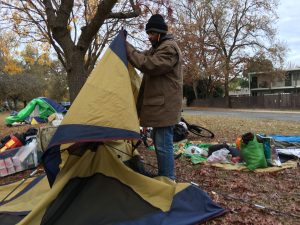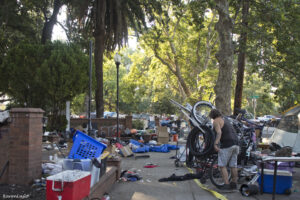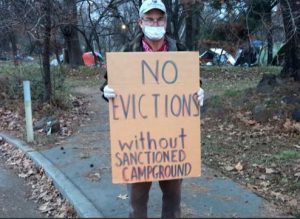by Leslie Layton & Natalie Hanson
posted July 17
The City of Chico announced today that it plans to dissolve the lawsuit settlement that for the past 18 months has restricted its ability to conduct eviction sweeps at homeless encampments. It says it will return to court.

The January 2022 Settlement Agreement produced by the Warren v. Chico lawsuit requires the City show it has shelter beds available before evicting unhoused people from public property. If the City prevails in a new round of litigation, it will once again be able to enforce anti-camping ordinances and conduct eviction sweeps freely.
In today’s press release from the City, it said the agreement should be replaced following the 6-3 U.S. Supreme Court ruling in Grants Pass v. Johnson. The City said it’s proposing “a new agreement that would supersede the Warren Settlement Agreement …”
In Warren v. Chico, eight unhoused plaintiffs represented by the legal aid agency Legal Services of Northern California (LSNC) sued the City over the mass evictions that took place several years ago.

A July 15 letter from City Attorney John Lam requests a response from the plaintiffs by 5 p.m. on the following day, July 16.
LSNC attorney Cory Turner wrote in a July 16 letter to the City that the agency would not be able to respond within one business day, in part because the plaintiffs are unhoused and have to be contacted. “Your demand to respond in one business day is arbitrary and unreasonable,” states LSNC Special Assignment Attorney Turner.
The City’s decision to sue its way out of the agreement is “going to cost a lot of money,” predicts Councilmember Addison Winslow, who issued his own press release today that reflects his minority position on the City Council.
What does the City want?
City Attorney Lam wrote that the City is halting negotiations that were underway via the dispute resolution process and proposed a new agreement based on three premises:
- The City agrees to continue to fund and operate the pallet shelter village Genesis until the end of the Settlement Agreement term, at which time the sitting City Council may determine (with public input) its future.
- The City agrees to provide for one alternate camping site “at a location of the City’s choosing” for the remainder of the year.
- All City enforcement of anti-camping ordinances and regulations will be consistent with the recent Grants Pass decision and local, state and federal laws.
A City press release argues that the settlement has been “unworkable … by restraining the City’s ability to timely address public health and safety issues on public property and causing great distress to neighboring businesses and residents.”
The unhoused plaintiffs in Warren v. Chico relied on the 2019 Martin v. Boise ruling that makes cities show there are shelter bed options before they evict people sleeping in public spaces. The Warren settlement required, among other things, the opening of Genesis and the Alternate Site campground at Eaton and Cohasset roads.
LSNC attorney Turner wrote that the settlement was produced after seven months of “good faith negotiations” between July 2021 and January 2022.
“We have found no legal authority, and you have provided none, to support the City’s assertion that the Grants Pass decision, alone, allows it to void the existing agreement and write a new one,” Turner wrote.
Discord on the Council
Mayor Andrew Coolidge issued a statement today reflecting the Council majority’s views. Coolidge said that when he was elected alongside several other conservative Council members in December 2020, their goal was to “clean up our parks and waterways.”
Coolidge said the City’s proposed new agreement would allow it to fully enforce its ordinances and complete that job.

Coolidge said the modified agreement “would begin a slow-close process of the alternative resting site at Eaton and Cohasset roads and it would continue the operation of the pallet shelter with new rules and regulations. With the change in the law, and this definitive ruling from the Supreme Court, we believe what we offer is not only fair but the right thing to do.”
But Councilmember Winslow’s press release, titled “Give Us Everything, or the Pallet Shelter Gets It,” argues that the City is holding the pallet shelters “hostage” in order to return to a policy “that produced mass evictions in the winter.”

The City, he says, has in effect asked LSNC “to remove everything within the Warren v Chico Settlement Agreement” in exchange for a promise that it will maintain the pallet shelters until the termination of the agreement in January 2027.
“LSNC refused the offer and the City is now seeking permission … to exit the Settlement Agreement entirely,” Winslow’s press release states.
“Even if the Supreme Court allows cruelty from the government and the Brown Act allows secrecy, our community deserves thoughtful and humane solutions developed with openness and transparency,” Winslow states.
Dispute resolution process abandoned
The Settlement Agreement’s dispute resolution process had apparently produced a so-called “Implementation Agreement” that may now be abandoned.
Councilmember Winslow said the agreement was “eight months in the making” and “would have led to improvements for health, safety, and quality of life at the Eaton and Cohasset encampment and allowed the City to expedite evictions of other encampments.”
The agreement “is fucking there and we could sign it,” an exasperated Winslow told ChicoSol by phone today.
LSNC’s Turner argues that the City should also be using the dispute resolution process to modify the original settlement.
“Your letter and your July 15 email to the court make clear that the City does not intend to follow the Settlement Agreement’s dispute resolution process,” Turner wrote to the City. “Yet you offer no legal authority or argument for this position. To begin the dispute resolution process, the City should send us the details of its proposed revised settlement agreement so that we have sufficient information and understanding to discuss with our clients.”
The Council’s response to the Grants Pass ruling was apparently developed during closed sessions at meetings held July 9 and 16. It’s unclear why there were no announcements on decisions made following either of the closed sessions as required by the Brown Act.
Leslie Layton is editor of ChicoSol, and Natalie Hanson is a contributing editor.

“It’s unclear why there were no announcements on decisions made following either of the closed sessions as required by the Brown Act.” And all this time I thought it was “…government of the people, by the people and for the people.” Wouldn’t that mean fewer closed sessions? And more info about what happened in closed sessions? And what about, “…liberty and justice for all.” Apparently, just not now, in Chico. Time to pay a little more attention to City Council meetings.
I certainly hope the Chico City Council members have a plan to take care of the social needs of the pallet shelter folks when they get there ? Just to place them in a 12’x12′ enclosure is possibly more inhumane than leaving those folks outdoors. Develop a plan with county social services and get these individuals transitional direction.
My ex landlord evicted me because I have a disability and asked to have a couple bars up and the heater was broken and I asked him to fix it and then he didn’t so I called code enforcement and they said that he had to and he never did and then because I kept reporting him he lied about me not paying rent for 6-7 months